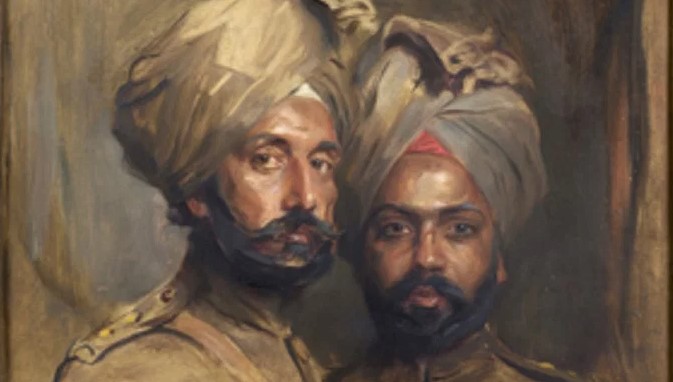The painting appears to have been created for de László’s own collection and it remained in his studio until he died in 1937…reports Asian Lite News
A portrait by Anglo-Hungarian painter Philip de Laszlo of two Indian soldiers who fought in World War I was placed under a temporary export bar by the British government to allow time for a UK institution to acquire the “wonderful and sensitive” work to prevent it leaving the country.
The unfinished portrait, valued at around GBP 650,000, depicts cavalry officers Risaldar Jagat Singh and Risaldar Man Singh – junior troop commanders in the British Indian Army’s Expeditionary Force who served at the Battle of the Somme in France and presumed to have died in action.
The painting is extremely rare in depicting active Indian participants in the First World War.
“This wonderful and sensitive portrait captures an important moment in our history as soldiers were drawn from across the globe to help fight in the trenches of the First World War,” said Lord Stephen Parkinson, UK Arts and Heritage Minister.
“I hope this magnificent painting can remain in the UK to help tell the story of those brave soldiers and the contribution they and so many others made to Allied victory,” he said.
Around 1.5 million Indian soldiers were deployed during World War I and according to records, the two soldiers in the painting sat for the artist in London two months before being sent to France to fight in the trenches.
It is described as a fine example of a portrait by the renowned 20th-century artist, which captures an important moment in British history as soldiers from across the British Empire came to fight in Europe.
The painting appears to have been created for de László’s own collection and it remained in his studio until he died in 1937.
The UK government’s decision to impose an export bar follows the advice of the Reviewing Committee on the Export of Works of Art and Objects of Cultural Interest (RCEWA).
The committee made its recommendation based on the criterion for its outstanding significance to the study of the Indian contribution to the war effort and the individuals involved.
“Philip de László was one of Britain’s most distinguished society portrait painters of the early 20th century. But this sensitive portrait, the more powerful because it is unfinished, offers an exceptionally rare glimpse not of maharajahs or generals but of two ‘ordinary’ middle-ranking Sikh soldiers about to depart for the horrors of the Battle of the Somme,” said RCEWA Member Peter Barber.
“The enormous contribution made by them and millions of other Indians to Britain’s war efforts between 1914 and 1918 has until recently been largely overlooked and the life stories of de Laszlo’s sitters remain to be uncovered. Yet numerous descendants of Indian soldiers now live in Britain, rendering the portrait ‘British’ at several, increasingly significant, levels,” he said.
According to Barber, the portrait also raises more general questions of personal and externally perceived British identity.
That the painting, apparently undertaken voluntarily and without payment, had special meaning for the artist is suggested by the fact that it remained in his studio until he died.
ALSO READ-Sunak slams UK’s ‘anti-maths mindset’
